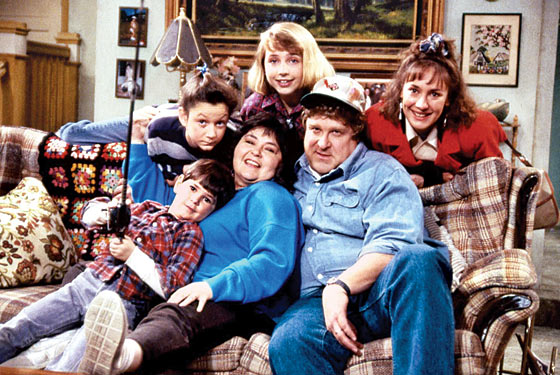And I Should Know
 |
Season one, 1988: From top, Sarah Gilbert (Darlene), Lecy Goranson (Becky), Laurie Metcalf (Jackie), Goodman, Barr, and Michael Fishman (D.J.). (Photo: ABC/Neal Peters Collection) |
I went to complain to Brandon, thinking he could set things straight, as having a robbed star might be counterproductive to his network. He told me, “You were over 21 when you signed that contract.” He looked at me as if I were an arrogant waitress run amok.
I went to my agent and asked him why he never told me that I would not be getting the “created by” credit. He halfheartedly admitted that he had “a lot going on at the time” and was “sorry.” I also learned that it was too late to lodge a complaint with the Writers Guild. I immediately left that agency and went to the William Morris Agency. I figured out that Carsey and Werner had bullshitted Matt Williams into believing that it was his show and I was his “star” as effectively as they had bullshitted me into thinking that it was my show and Matt Williams was my “scribe.” I contacted Bernie Brillstein and a young talent manager in his office, Brad Grey, and asked them to help me. They suggested that I walk away and start over, but I was too afraid I would never get another show.
It was pretty clear that no one really cared about the show except me, and that Matt and Marcy and ABC had nothing but contempt for me—someone who didn’t show deference, didn’t keep her mouth shut, didn’t do what she was told. Marcy acted as if I were anti-feminist by resisting her attempt to steal my whole life out from under me. I made the mistake of thinking Marcy was a powerful woman in her own right. I’ve come to learn that there are none in TV. There aren’t powerful men, for that matter, either—unless they work for an ad company or a market-study group. Those are the people who decide what gets on the air and what doesn’t.
Complaining about the “created by” credit made an enemy of Matt. He wasted no time bullying and undermining me, going so far as to ask my co-star, John Goodman, who played Roseanne Conner’s husband, Dan, if he would do the show without me. (Goodman said no.) That caused my first nervous breakdown.
“I so admire Dave Chappelle. I did not have the guts to walk away.”
To survive the truly hostile environment on set, I started to pray nonstop to my God, as working-class women often do, and to listen nonstop to Patti Smith’s “People Have the Power.” I read The Art of War and kept the idea “He that cares the most, wins” upmost in my mind. I knew I cared the most, since I had the most to lose. I made a chart of names and hung them on my dressing-room door; it listed every person who worked on the show, and I put a check next to those I intended to fire when Roseanne became No. 1, which I knew it would.
My breakdown deepened around the fourth episode, when I confronted the wardrobe master about the Sears, Roebuck outfits that made me look like a show pony rather than a working-class mom. I wanted vintage plaid shirts, T-shirts, and jeans, not purple stretch pants with green-and-blue smocks. She bought everything but what I requested, so I wore my own clothes to work, thinking she was just absent-minded. I was still clueless about the extent of the subterfuge.
Eventually she told me that she had been told by one of Matt’s producers—his chief mouthpiece—“not to listen to what Roseanne wants to wear.” This producer was a woman, a type I became acquainted with at the beginning of my stand-up career in Denver. I cared little for them: blondes in high heels who were so anxious to reach the professional level of the men they worshipped, fawned over, served, built up, and flattered that they would stab other women in the back. They are the ultimate weapon used by men against actual feminists who try to work in media, and they are never friends to other women, you can trust me on that.
I grabbed a pair of wardrobe scissors and ran up to the big house to confront the producer. (The “big house” was what I called the writers’ building. I rarely went there, since it was disgusting. Within minutes, one of the writers would crack a stinky-pussy joke that would make me want to murder them. Male writers have zero interest in being nice to women, including their own assistants, few of whom are ever promoted to the rank of “writer,” even though they do all the work while the guys sit on their asses taking the credit. Those are the women who deserve the utmost respect.) I walked into this woman’s office, held the scissors up to show her I meant business, and said, “Bitch, do you want me to cut you?” We stood there for a second or two, just so I could make sure she was receptive to my POV. I asked why she had told the wardrobe master to not listen to me, and she said, “Because we do not like the way you choose to portray this character.” I said, “This is no fucking character! This is my show, and I created it—not Matt, and not Carsey-Werner, and not ABC. You watch me. I will win this battle if I have to kill every last white bitch in high heels around here.”





0 comments:
Post a Comment